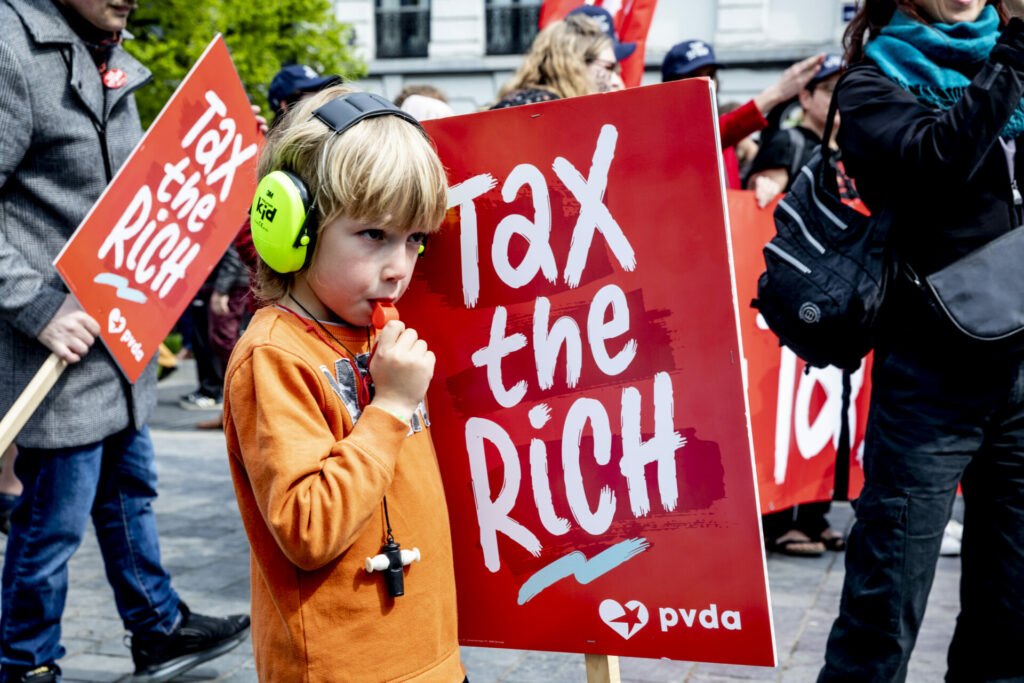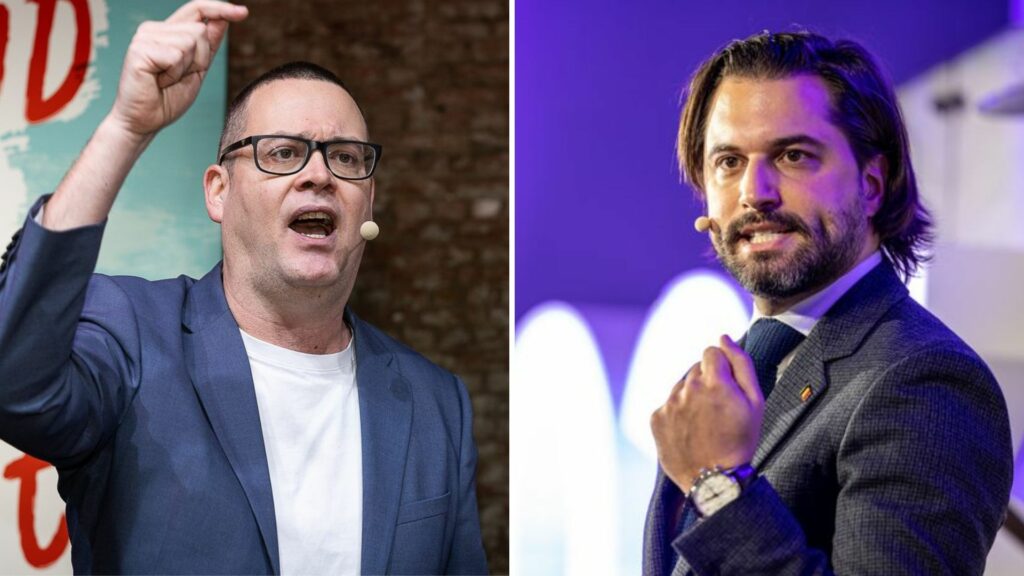After last week's clash between Prime Minister Alexander De Croo (Open VLD) and Paul Magnette (PS), Wednesday's televised debate pitted the leaders of the Francophone liberal MR Georges-Louis Bouchez and the radical left Belgian Workers' Party (PTB-PVDA) Raoul Hedebouw against each other.
Bouchez and Hedebouw – often been described as meilleurs ennemis ("best enemies") by the French-speaking press – and are long-standing political rivals. This made it no surprise that RTL's debate was a much tenser affair than last week's friendly agree-to-disagree discussion between De Croo and Magnette.
Once the curtains came up, Hedebouw immediately went on the attack, saying that his MR is not a reformist movement but instead "the Movement of the Rich."
In response, Bouchez resorted to his much-used attack of drawing the questionable equivalence between Vlaams Belang and the Belgian Worker's Party, asking why there was a cordon sanitaire in place around the far-right Flemish party (even though he has not always stuck to it), "but not for the far-left" – meaning PTB-PVDA. He added that "the two extremes should be treated the same" and that "no far-left regime has ever respected democratic values."
Hedebouw called Bouchez's words "appalling" and retorted that the PTB-PVDA is a democratic party that aims to change Belgium in the coming months and "will not be silenced."
Taxing the rich?
While both party leaders agree that Belgium's taxation system needs to change, they have extremely opposing views on how that should happen.
For Bouchez, taxes need to be lowered, particularly for the rich. "Let's take less tax from those who work. The richest people are taxed enormously. All capital is taxed."
For Hedebouw, however, whose party has been running on a 'tax the rich' platform, the entire philosophy of taxation should be changed. "Belgium is a tax hell for workers and a paradise for the ultra-rich. Small capital is taxed but the rich are exempt. It's always the regular people who are going to be made to pay."
Additionally, Hedebouw made it clear that PTB-PVDA will only join the government with a plan to return the retirement age to 65 (after it was raised to 67). Immediately, Bouchez called the party "full of bullshit" and said that reducing the pension age to 65 will "bankrupt our pension system and prevent our children from having pensions in the future. We want to take account of the arduous nature of work."

Credit: Belga / Hatim Kaghat
In terms of safety and security in the face of drug trafficking and repeated shootings, especially in Brussels, MR last week proposed to put the army back on the streets – a proposal that was quickly rejected by the Federal Government.
"What we need to do is strengthen the federal judicial police. We need to tackle the problem at the source," Hedebouw said, stressing that Bouchez's proposal was "not a good idea."
The drug problem in Belgium stems from the port of Antwerp, he added. "Today, do you know how many containers are checked by the customs police? One in 40. That's crazy. Why is that? Because the customs police do not have the resources."
Hedebouw also stressed that under the previous Federal Government – which consisted of both liberal parties Open VLD and MR, Flemish nationalists N-VA and Flemish Christian Democrats CD&V – Belgium lost 200 to 300 judicial police workers. "There is a lack of resources," he added.
Soldiers on the streets
To improve the situation, PTB-PVDA wants to strengthen the judiciary by investing in investigating judges and the judicial police, "but I do not think that putting soldiers on the street will solve the problem."
Secondly, he denounced Belgium's banking secrecy, saying that abolishing that culture of secrecy would help a lot in the fight against drug trafficking. "Do you know how [prohibition-era American gangster] Al Capone was caught? Through financial transactions. Banking secrecy is still a big problem in Belgium."
Lastly, Hedebouw wants to give more power to community policing – a strategy that focuses on developing relationships with the community. "That is currently being neglected because of what's going on in the neighbourhoods. But security is a basic right for all the inhabitants of our country."

Credit: Belga / Luc Claessen
When Bouchez was asked about his ideas to combat insecurity, he underlined that people should "stop telling fables" about the situation in Belgium. "Today, we have 336 police officers per 100,000 inhabitants; that's the European average. That is more than France, the Netherlands, Germany and Luxembourg. So what's wrong with Belgium?"
According to him, what is wrong with Belgium is that the police are "being asked to carry out 147 missions in addition to those provided for in the police act," Bouchez said, such as confirming people's domicile, for example.
"When someone breaks your rear-view mirror, you get a ticket, not so that we can find the person who broke it, but for the insurance company. When you are broken down on the motorway now, you have to call 112 for a tow truck," he said. "It all makes no sense. We need to relieve the police of useless tasks so that they can get on with their work."
Related News
- De Croo-Magnette debate: New coalition not ruled out, but who will be Prime Minister?
- MR's pushback on gambling regulation is 'embarrassing', say political opponents
- PS leader Magnette 'unsuitable' to become Prime Minister, says De Wever
Still, Bouchez said, the situation in Brussels today is "so dramatic that the authorities need to be armed" to act as a deterrent. "And what I am saying is not just wishful thinking. When we had the military on the streets in Brussels, we reduced crime by 5% and certain offences, such as personal injury, were even down by 12%."
"So, when you see the results, I do not understand all this reticence and all this fuss about community policing. We also need to be able to impose penalties," he stressed. "But today, if you have community police who walk past young people, who are dealing drugs amongst themselves, but who are told not to intervene, there's absolutely no point. We need firmness and penalties."
Lastly, when the party presidents were asked if they were candidates to become Prime Minister should their party become the greatest, Bouchez said that he was "ready if I have to." Hedebouw, in turn, said he would want to get involved, but "it will not be with MR."

